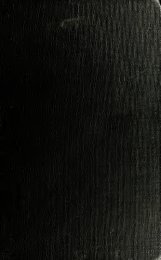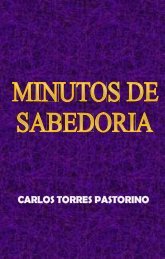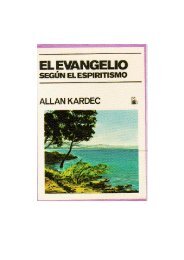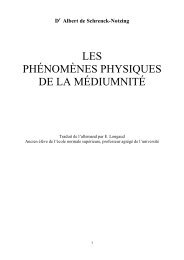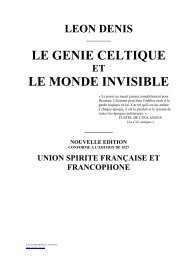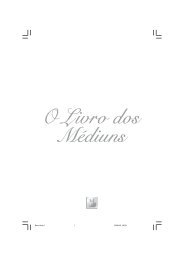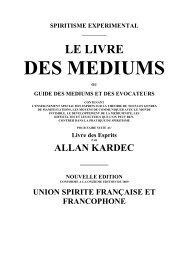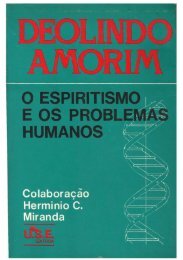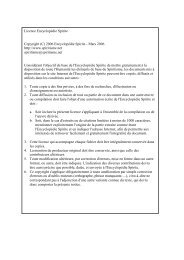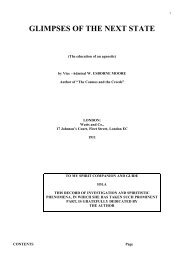'Twixt two worlds : a narrative of the life and work of William Eglinton
'Twixt two worlds : a narrative of the life and work of William Eglinton
'Twixt two worlds : a narrative of the life and work of William Eglinton
Create successful ePaper yourself
Turn your PDF publications into a flip-book with our unique Google optimized e-Paper software.
—<br />
Evidence for Independent Mind- Action in Psychography. 157<br />
on <strong>the</strong> slate. For this purpose, with closed eyes, I took a book from Mr. <strong>Eglinton</strong>'s shelves,<br />
which held about <strong>two</strong> hundred volumes. A crumb <strong>of</strong> pencil was placed upon <strong>the</strong> slate on<br />
which Mrs. Kimber <strong>and</strong> Mrs. Wilson had written <strong>the</strong> number <strong>of</strong> <strong>the</strong> page <strong>and</strong> line respectively.<br />
A second slate <strong>of</strong> exactly <strong>the</strong> same size <strong>and</strong> form was placed over this one, <strong>and</strong> <strong>the</strong> book<br />
was put by myself on <strong>the</strong> top <strong>of</strong> <strong>the</strong> <strong>two</strong> slates. Mr. <strong>Eglinton</strong> <strong>and</strong> Mrs. Kimber rested <strong>the</strong>ir<br />
h<strong>and</strong>s on <strong>the</strong> book.<br />
It should again be noted that :—(1) Precaution had been taken that no one besides Mrs.<br />
Kimber knew what number she had written on <strong>the</strong> slate to express <strong>the</strong> page to be recited, <strong>the</strong><br />
same being true <strong>of</strong> <strong>the</strong> number Mrs. Wilson had written to express <strong>the</strong> line <strong>of</strong> that page.<br />
(2) The slates <strong>and</strong> <strong>the</strong> book were on <strong>the</strong> top <strong>of</strong> <strong>the</strong> table immediately before <strong>the</strong> eyes <strong>of</strong> all<br />
present. (3) Until I had placed <strong>the</strong> book upon <strong>the</strong> slates no one could have known what<br />
volume had been taken from <strong>the</strong> shelves. Mr. <strong>Eglinton</strong> did not touch <strong>the</strong> book until <strong>the</strong><br />
moment when he <strong>and</strong> Mrs. Kimber rested <strong>the</strong>ir h<strong>and</strong>s <strong>the</strong>reon. It had been h<strong>and</strong>led by myself<br />
alone, <strong>and</strong> I was particularly careful nei<strong>the</strong>r to open it nor to look at its title. (4)<br />
Nei<strong>the</strong>r Mrs.<br />
Kimber, Mrs. Wilson, nor myself have <strong>the</strong> slightest recollection <strong>of</strong> ever having seen or heard <strong>of</strong><br />
<strong>the</strong> said <strong>work</strong>, which was " Ghose's Indian Chiefs, Rajahs, etc., Part II."<br />
After <strong>the</strong> lapse <strong>of</strong> a few seconds <strong>the</strong> sound <strong>of</strong> writing was heard within <strong>the</strong> slates. Upon<br />
<strong>the</strong> usual signal <strong>of</strong> three taps (also seemingly within <strong>the</strong> slates), to indicate <strong>the</strong> end <strong>of</strong> <strong>the</strong><br />
experiment, I examined <strong>the</strong> slates, <strong>and</strong> found <strong>the</strong> following sentence, written on <strong>the</strong> under<br />
one, with <strong>the</strong> pencil resting on <strong>the</strong> full-stop at <strong>the</strong> end. (I may mention here that all <strong>the</strong><br />
writings throughout <strong>the</strong> entire seance were conscientiously punctuated, <strong>and</strong> that every t was<br />
crossed <strong>and</strong> every /' dotted.) This is <strong>the</strong> sentence:<br />
"Page 199, line 14, is a table. The last<br />
word is o." Mrs. Kimber had written 199, <strong>and</strong> Mrs. Wilson 14. I <strong>the</strong>n opened <strong>the</strong> book<br />
<strong>and</strong> turned to page 199, which commences thus :— " Table A. Estates belonging to <strong>the</strong> Hon.<br />
Maharaja Jotindro Mohun Tagore Behaditr," etc. The fourteenth line <strong>of</strong> that page is as<br />
follows :— " Shikharbdti, 24 Pargannas, 210 O o." This experiment closed <strong>the</strong> seance. Does it<br />
prove <strong>the</strong> action <strong>of</strong> an independent— <strong>of</strong> a fifth mind <br />
As such a test, it seems to have this weak point, namely that <strong>the</strong> book belonged to<br />
<strong>the</strong> medium, <strong>and</strong> had probably been read by him. It can scarcely be supposed that he remembered<br />
<strong>the</strong> fourteenth line <strong>of</strong> <strong>the</strong> 199th page in <strong>the</strong> sense that he could have reproduced it at will.<br />
How <strong>the</strong>n, since nothing is lost, <strong>and</strong> assuming it to have been at one time a part <strong>of</strong> his<br />
consciousness, <strong>and</strong> lurking in <strong>the</strong> storehouse <strong>of</strong> his memory—how, I say, by what process was<br />
that little unimportant fact revived <br />
We are reminded <strong>of</strong> <strong>the</strong> mainsprings whereby latent thoughts are revived. There is (1) <strong>the</strong><br />
principle <strong>of</strong> association <strong>of</strong> ideas, (2) <strong>the</strong>re is volition, (3) <strong>the</strong>re is that acquisition <strong>of</strong> energy<br />
which <strong>the</strong> reproductive faculty displays in certain abnormal states <strong>of</strong> nervous excitement.<br />
1. In <strong>the</strong> experiment before us how could association be a reproducing agent "199<br />
page, line 14," suggests nothing. When we read a book we don't read <strong>the</strong> numbers <strong>of</strong> <strong>the</strong><br />
pages, <strong>and</strong> count <strong>the</strong> lines <strong>of</strong> each page. Yet we must suppose <strong>the</strong> line lying latent in Mr.<br />
<strong>Eglinton</strong>'s mind, duly labelled with <strong>the</strong> proper number <strong>and</strong> page. This is supposing too much.<br />
We admit that whatever a person reads may lurk in his mental storehouse to <strong>the</strong> end <strong>of</strong><br />
his <strong>life</strong>, but we cannot admit that <strong>the</strong> numbers <strong>of</strong> every line on each page <strong>of</strong> every book he<br />
reads enter that storehouse at all. He cannot, <strong>the</strong>refore, give out what he does not possess.



